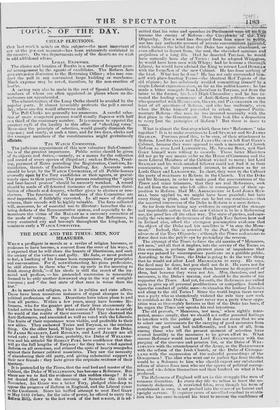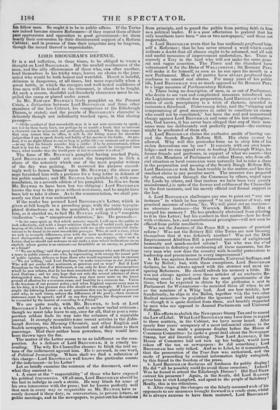THE DUKE AND THE TIMES: MEN, NOT MEASURES.
WHEN a profligate in morals or a reviler of religion becomes, or professes to have become, a convert from the error of his ways, it is expected that he will shun the haunts of libertinism, and seek the society of the virtuous and godly. He feels, or must pretend to feel, a loathing of his former boon companions, their principles and conversation. For if, notwithstanding his pious professions, he still cleaves to those who " rise up early in the morning to drink strong drink,"—if his abode is still the resort of the im-
moral and profane, his pretended conversion is reasonably deemed to be only another downward step in the way of unright- eousness ; and " the last state of that man is worse than the first."
As in morals and religion, so is it in politics and state affairs. There have been numerous instances of signal changes in the political professions of men. Desertions have taken place to and from all parties. Within a few years, many have become Re- formers, who for the greater part of their lives strenuously de- fended rotten boroughs. But what course did they take to satisfy the world of the reality of their conversion ? They shunned the Anti-Reformers, and associated as well as voted with the Liberals. The fruits of their repentance were visible, and profitable to their new allies. They eschewed Tories and Toryism, as the unclean thing. On the other hand, Whigs have gone over to the Duke. Sir JAMES SCARLETT, Lord ROSSLYN, and Lord JERSEY are all noted rats; and by this time, probably, the Duke of WELLING- TON and his attache Sir ROBERT PEEL have confidence that they will go the full lengths of Toryism : for they have voted against Reform on all occasions, and evinced the spite of hearty renegades against their former political associates. They saw the necessity of abandoning their old party, and giving substantial support to their new friends : they have given the requisite evidence of their apostasy. It is pretended by the Thnes, that the real lord and master of the Cabinet, the Duke of WELLINGTON, has become a Reformer. But where are Ave to find the evidence of this sudden change? It is not denied ithat up to the morning of Saturday the 15th of November, his Grace was a bitter Tory, pledged chin-deep to 'oppose the prog„sess of Reform in England, and the Liberal cause -till the Continent. Since his baffled attempt to oust Earl GREY IE May 1832 (when, for the sake of power, he offered to carry the Reform Bill), dow.r to the last week of the last session, it is ad- mitted that his votes and speeches inePerliamentwere tl400 as became the enemy of Reform—the Coryphiens- of thei Oligarchy. Not a word has dropped, from him since in public, nor has any authentic account of private conversation .appeared,•which induces the belief that the Duke has again abandoned, or even affected to depart from, • the real, the cherished opinions and prejudices of a long life. Had he .deserted Tomism, he would.
have naturally been shy of Tories : had he adopted Whiggisrm he would have been seen with Whigs: had he become a thorough Liberal, he would have advised the King to intrust Lord DURHAM with the formation of the new Cabinet. He has done nothing of the kind. What has he done ? He has not only surrounded him- self with place-hunting Tories—the identical Red Tapists of the old rjgime; he has sedulously avoided committing himself be ea single Liberal expression even, as far as the public knows ; he has
made a bitter renegade from Liberalism to Toryism, not from the latter to the former, his Lord High Chancellor ; and he has in- vested the leading commouer of Anti-Reform politics—the man
who quarrelled with H users ecee, GRANT, and PALMERSTON on the least of all questions of Reform, and who has uniformly, even
when the Duke himself premnded to relent, opposed Parlia- mentary Reform—this man he has invested nominally with the first place in the Government. Does this look like a disposition to carry rout the principles of Reform ? But there is more to come.
What is almost the first step which these two " Reformers" take together ? It is to make overtures to Lord STANLEY and SirJ AMES GRAHAM. Precious proof this, to be sure, of their attachment to Reform. Lord STANLEY and Sir JAMES Gut tRAM left Earl GREY'S Cabinet, because they were opposed to such a measure of Church Reform, as even Lord LANSDOWNE, Mr. SPRING RICE, and Earl GREY himself were willing to concede. These latter Ministers did not go by any means so far as the House of Commons and the
more Liberal Members of the Cabinet wished to move; but Lord
STANLEY and his weak-minded follower could not find it in their consciencies, or their presumed interest, to advance as far as Lords GREY and LANSDOWNE. In short, they were in the Cabinet the party of resistance to Reform in the Church. Yet the Duke and Sir ROBERT, ill order to make good the asseverations of the Times and other trimmers, that they are real -Reformers, seek for aid from the men who left office in consequence of their op- position to Reform. Had Mr. ABERCROMBY or Lord JOHN Rus- SELL been applied to, we might have been puzzled; but here every thing is plain, and there can be but one conclusion—that the asserted conversion of the Duke to Reform is a mere fiction.
So far from there being any evidence in support of the strange and improbable notion that the new Cabiuct is to be a Reforming one, the proof lies all the other way. The state of parties, and espe- cially the vehement declarations of the High Tory faction here and in Ireland also, afford the strongest presumptive evidence that
the object of the Duke and his satellites is " to stop the Move • ment." Indeed, this is avowed by the Post, the plain-dealing advocate of the Tory Oligarchy although the Times endeavours to throw dust into the pub'ic eye by pretending the reverse. The attempt of the Times to force the old maxim of" Measures, not nsen," and all that it implies, into the service of the Tories on
this occasion, is perhaps the greatest piece of impudence that
ever was palmed by unscrupulous partisans on a gullible public. According to the Times, the Duke is going to do the very thing that he would not allow Lord MELBOURNE to carry. He says, the deed may be done, but you shall not do it. He cares not for the measures: he did not oppose them because he disapproved of them, but because they were not his. Men, therefore, and not measures, is the Duke's maxim, and should be the motto of his supporter the Times. And yet, forsooth, the Reformers are called
upon to give up all personal predilections or antipathies founded upon the conduct of public men—to abandon the leading Liberals and cling to the old Tories I Since the world began there never
was a party who so shamelessly violated the rule they now seek to establish as the Duke's. There never was a party whose oppo- sition was so thoroughly factious as that of the Duke has been, if his organ the Times now speaks his real intentions. The old proverb, " Measures, not men," when rightly inter- preted, means simply, that we should not suffer personal feelings to interfere with the public good. It does not mean that we are to select our instruments for the carrying of good measures from among the good and bad indifferently, and least of all, from among those who till the present moment of selection have avowed hostility to the measures to be given effect to. What sincere Reformer would intrust Lord ELLENBOROUGH with the purging of the sinecure and pension list, or the Duke of WEL- LINGTON with the retrenchment of the Army, or the Beeemeoens with the reform of the Irish Church, or the Duke of CUMB.ER- LAND with the suppression of the unlawful proceedings of the Orangemen ? The idiot who went out to gather figs from thistles would be a Solomon to him who should expect any substantial reform of abuses from men who are the spawn of political corrup- tion, and who fatten themselves and their kindred on what it has produced. The Reformers of England will act in this struggle like men of common discretion. lim every-day life we refuse to trust the no- toriously dishonest. A convicted felon, even though his term of punishment is over, is not pushed into the p!ace of an honest anti upright servant. It requires years of unsullied conduct to enable him who has once betrayed his trust to recover the confidence of
Lis fellow men. So ought it to be in public affairs. If the Tories are indeed become sincere Reformers—if they repent them of their past oppressions and opposition to good government—let them testify their conversion by their disinterested support of a Reform Cabinet; and in process of time their iniquities may be forgiven, though the record thereof is imperishable.





















 Previous page
Previous page